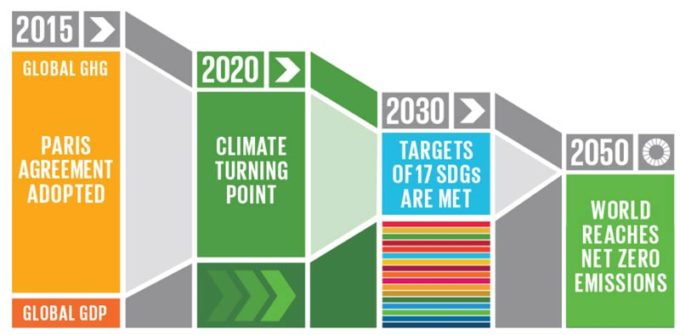
Digital sustainability: it pays to be a leader, not a laggard
Companies that excel in both digital and sustainable transformation attract a stock market premium, according to research. So, how do you tap into that value? ...

by Knut Haanaes Published 6 March 2023 in CEO Circle • 6 min read
As organizations pursue the decarbonization imperative with increasing determination, there is a growing realization that no single leader or business function alone will be able to drive progress towards net zero. One role that will nevertheless be vital in the process is that of the Chief Human Resources Officer (CHRO).
The transition to net zero is a challenging exercise in large-scale transformation. Organizations will approach decarbonization in different ways – and certainly at different paces – but all will experience a period of significant change and upheaval. At IMD, our experience of transformation initiatives tells us that they succeed or fail according to the leadership and the capabilities of the organization.
Enter the CHRO, whose role is to work with the leadership of the organization as it strives to provide adequate direction and a supportive culture to allow the workforce to deliver its net zero vision. The CHRO must operate at both strategic and organizational levels, helping the leadership to develop a clear purpose while scaling up the understanding and competencies of those who will put this purpose into practice.
This is a challenging remit. Transformation requires both bold innovation and courageous decision making to marshal the requisite technical skills, which are themselves in short supply. Moreover, organizations must drive internal change with urgency if they are to meet the Paris Agreement goals to reduce emissions by 45% by 2030 and reach net zero by 2050.
Nevertheless, CHROs are well placed to rise to the occasion. The skills they have developed around people management, learning and development, and their ability to fine-tune organizational culture, will all be vital on the journey toward net zero.
Above all, the task for CHROs on net zero is to build collaborative and systems leadership skills in their organizations. We can only confront climate risk together – no single organization has sufficient resources or power.
Strategically, as the organizational leadership decides how to combine purpose and sustainability, the CHRO will play a supportive role. But that is not to downplay the role’s input; just as operational functions such as Sales and Marketing will have strong views on the priorities of the organization’s clients and customers, CHROs will understand the internal dynamics of the business in terms of their effect on employees.

And just as finance will drive the debate around cost and reporting, so the CHRO will frame the conversation in terms of talent – including the potential to harness sustainable transformation to have a broader positive impact on recruitment and retention. Moreover, as the CEO will want to articulate their vision for the whole business, so the CHRO will be vital in transmitting that vision through cultural change.
The shift to net zero will require senior leaders to make tough decisions – which businesses they want to buy, sell or close, and which new products and services to develop. CHROs will need to encourage the C-suite to have the courage of its convictions, and to focus on the long term, even when short-term ROIs fall short of expectations. CHROs will help the C-suite to articulate to the whole organization its commitment to sustainability, and to chart a course that everyone can follow.
CHROs must also support business leaders in entering a collaborative ecosystem. Many significant sustainability gains will come from working with new partners and suppliers across the value chain, and CHROs can be instrumental in forging and managing those relationships.
Persuading colleagues to think and act differently is rarely straightforward. Nevertheless, CHROs who engage closely with the development of the strategic vision for decarbonization and net zero will have a key advantage when it comes to managing the execution. Their position within the C-suite gives them the leverage to drive change throughout the organization.
As the organization seeks to operationalize its net zero strategy, CHROs have access to a range of tools to help them prepare the workforce. In order to close skills gaps, it may be necessary to retrain staff, as well as refreshing the organization’s recruitment and retention strategies and retooling incentive schemes around sustainable behaviors. Building sustainability metrics into remuneration structures emphasizes the organization’s commitment to transformation and aligns that commitment with the interests of staff.
CHROs must also support business leaders in entering a collaborative ecosystem
Some employees may be concerned about changes to the business plan they signed up to follow when they joined the organization, particularly in areas of pursuing strong commercial performance, but setting new targets that reflect social or environmental KPIs, for example, provides an incentive to embrace transformation.
As well as driving internal transformation, it is just as vital that the CHRO curates the business’s public image as an employer of choice. For this reason, it’s important for CHROs to understand how the current workforce perceives the organization, both good and bad. Current employees can be powerful influencers in terms of setting public opinion of the organization and, if handled correctly, can be excellent ambassadors to the next generation of hires. Developing an employer value proposition (EVP) can also be a constructive way of designing a program to attract the people needed to drive the organization’s sustainability effort.
There will be obstacles along the route to a sustainable future. Many CHROs are already veterans in the battle for talent, and that experience will be required. The search for skills and knowledge to support sustainability can be hard – particularly while balancing the conflicting priorities of multiple stakeholders.
Nevertheless, if CHROs are able to support strong alignment at the top of the organization as it defines its purpose and help it to set out a compelling narrative for this vision, progress will be more rapid. Implementing transformational change is never an easy task. While CHROs will not determine strategy, their support will determine its success.

Lundin Chair Professor of Sustainability at IMD
Knut Haanaes is a former Dean of the Global Leadership Institute at the World Economic Forum. He was previously a Senior Partner at the Boston Consulting Group and founded their first sustainability practice. At IMD he teaches in many of the key programs, including the MBA, and is Co-Director of the Leading Sustainable Business Transformation program (LSBT) and the Driving Sustainability from the Boardroom (DSB) program. His research interests are related to strategy, digital transformation, and sustainability.

17 July 2024 • by Michael R. Wade, Evangelos Syrigos in Sustainability
Companies that excel in both digital and sustainable transformation attract a stock market premium, according to research. So, how do you tap into that value? ...

11 July 2024 • by Stéphane J. G. Girod in Sustainability
A series of watershed events forced CHANEL out of its comfort zone, culminating in the launch of CHANEL Mission 1.5°. With this new strategy, the luxury fashion house embarked on a journey...

5 July 2024 • by Avni Shah in Sustainability
Creative industries have a key role to play in creating positive social change. Here are six key insights to help them achieve their goals. ...

3 July 2024 • by Richard Baldwin, Salvatore Cantale in Sustainability
The EU Corporate Sustainability Reporting Directive (CSRD) will impose comprehensive and standardized sustainability reporting responsibilities on firms, adding unprecedented complexity to mergers and acquisitions. ...
Explore first person business intelligence from top minds curated for a global executive audience